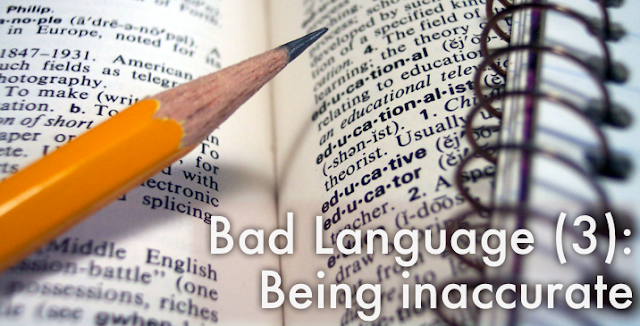I’ve been a little hung up on words recently. We need to be growing in our understanding of the language of our faith, but not in a way that excludes people or makes learning theory the most important thing. There’s one other thing, though, which I think we need to be wary off…
Getting sloppy
As we grow in our understanding, we learn all sorts of new and wonderful things. One common side effect of that is that we can forget the basics, or not consider them as important. We often don’t spend that much time thinking about how we use simple language, and how that affects those who may not understand things as we do.
Let me give an example: the word ‘church’. Of course we all know the church is the people, not the building. But in what ways do we most commonly hear and use that word. Is it about people? Really? I can think of lots of ways we use it:
- To talk about a building (‘This church was built in 1846’)
- To talk about one room in that building (‘We start with coffee in the foyer, then move through to the main church for the service.’)
- To talk about an event (‘I’m looking forward to church on Sunday’)
- To talk about a denomination (‘I’m part of the Baptist Church’)
- To talk about an activity or style (‘This is how we do church’)
Does that matter, really?
And this is where you might well say, ‘Come on Dave, does it really matter? Language evolves and changes. Words change in the meaning they have. Just deal with it!’ I have some sympathy for that. Why can’t ‘church’ mean both the people and the building? We all understand what we mean in any given context, surely, so it’s not that much of a problem.
But that’s the point. If we all did always understand, and everyone else did, then fine. But that’s not what language is about – language is about communicating so that everyone can understand what is going on. I think we are in deep confusion about what the church really is. Lots of people – forgivably – do think the church is first and foremost a building.
The way we use words shapes the way we end up thinking about things. ‘Church’ is an important word, and when it starts to mean ‘building’ then buildings suddenly become much more important than they were ever meant to be. And as it stops meaning ‘people’, people become less important than we were always meant to be. We start to think in the ways we speak.
And it’s not just us! People who weren’t taught at Sunday School that ‘the church is the people, not the building’ (a truism that wouldn’t need to exist if we just used ‘church’ to mean people all the time) don’t have any defences against such a misunderstanding. When we use that word to mean all sorts of things it doesn’t, we add layers to their confusion.
Ultimately, I don’t care if the words start to change. Call it whatever you like – I care deeply though if our theology and understanding starts to change as a result, or if we lead other people’s to do so. That matters a great deal.
Trying to be different
I don’t think that suddenly using all words ‘correctly’ will solve the problems, but I try to be as accurate as I can to avoid leading myself and others further astray. I make a point of referring to our ‘church’s building’. I’m glad that our pastor encourages our church to call the main room the ‘auditorium’ instead of ‘the main church’. I also try to ask people if they will be at the ‘meeting’, not if they will be ‘at church’. If we really believe the church is people, surely that should come out in the way we speak.
Other words I think face this kind of danger include ‘worship’, ‘pray’ and ‘mission’.
Any others, anyone? Not so we can enjoy having a rant and enjoying our own sense of being more correct than others, but so we can avoid unnecessary mistakes in our underlying theology.




